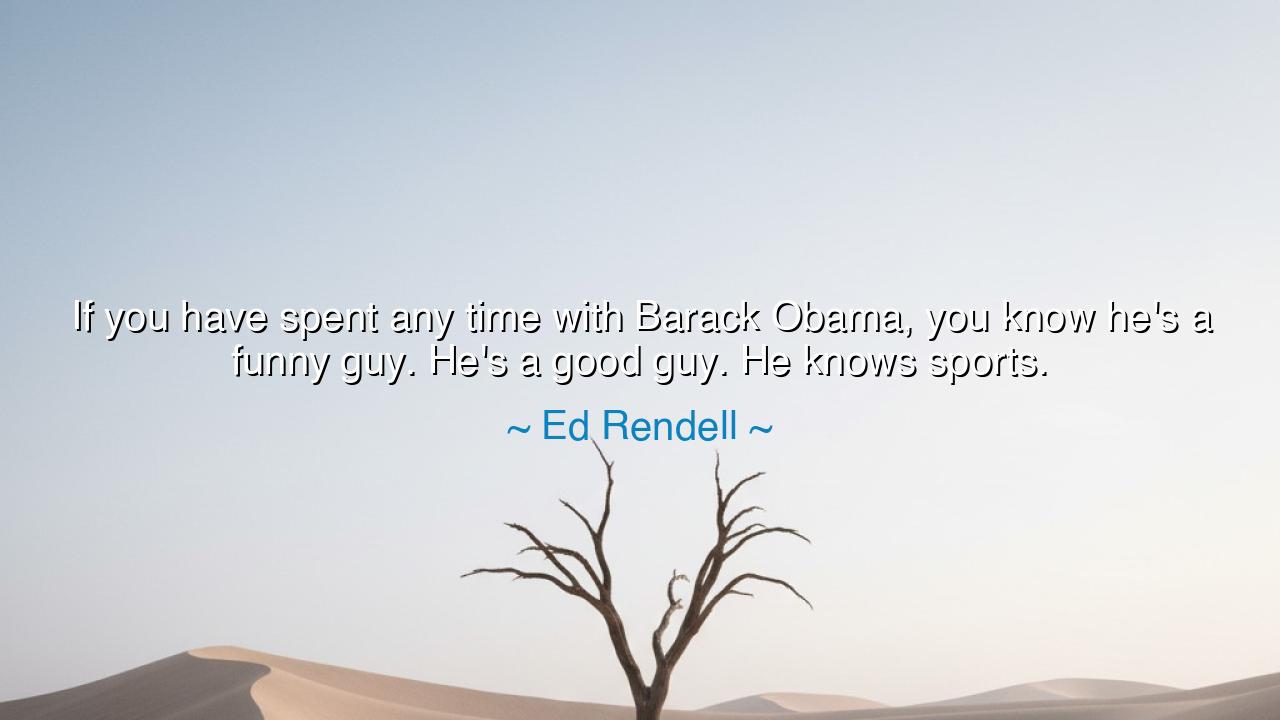
If you have spent any time with Barack Obama, you know he's a
If you have spent any time with Barack Obama, you know he's a funny guy. He's a good guy. He knows sports.






When Ed Rendell spoke the words, “If you have spent any time with Barack Obama, you know he’s a funny guy. He’s a good guy. He knows sports,” he gave us not merely a description of a man, but a glimpse into the hidden strength of leadership. For in this simple phrase lies the portrait of a ruler who is not aloof, not distant, but bound to the people by humor, by goodness, and by the universal bond of sports. It is as if Rendell were saying: greatness is not found only in speeches and laws, but in the humanity that connects a leader to those he leads.
The ancients often spoke of such qualities in their kings. They admired Alexander not only because he conquered the world, but because he could drink and laugh with his soldiers. They loved Pericles not only because he built temples, but because he walked among the citizens of Athens as one of their own. So too does Rendell remind us that Obama’s strength was not only in policy, but in presence. He was approachable, warm, and capable of finding common ground through the joy of laughter and the language of games.
To call him a funny guy is not trivial. Humor is a balm that dissolves pride, disarms hostility, and builds bridges between souls. The ruler who can laugh is the ruler who remembers that he is human, and the people who laugh with him see not only a figure of power but a companion of the heart. In a world where leaders often wear masks of severity, Obama’s laughter became a sign of his humanity, a reminder that strength need not always be cloaked in sternness.
And to call him a good guy is to speak of moral character. In every age, people long for leaders whose hearts are not corrupted by greed or cruelty. Goodness may sound plain, but it is the most powerful quality of all. The ancients knew this when they praised Marcus Aurelius as the “good emperor,” not because he was invincible in war, but because he was fair, humble, and just. So too does Rendell’s phrase suggest that Obama’s legacy rests not only on accomplishments, but on the goodness of his nature.
Finally, “he knows sports.” This, too, is no idle remark. To know sports is to understand teamwork, discipline, and the striving spirit that defines human endeavor. Sports are the common tongue of the people, from the humblest child playing on the street to the grandest athlete standing upon the Olympic stage. For a leader to speak this language is to show that he belongs not to an ivory tower, but to the living world of his people. It is a reminder that leadership is not detached, but grounded in the rhythms of ordinary life.
History gives us many examples of this connection between sport and leadership. Consider Theodore Roosevelt, who, before becoming president, was a boxer, a rider, and a vigorous advocate of the “strenuous life.” His passion for physical struggle and sport inspired a generation to seek vigor rather than comfort. In the same way, Obama’s love for basketball and his ease in speaking the language of competition made him relatable, approachable, and human.
The lesson for us is profound: greatness is not only in lofty deeds, but in the small things that reveal the heart. A leader must be approachable, must laugh, must be good, and must share in the common joys of life. And we, too, if we would lead—even in our families, our workplaces, our communities—must strive for the same balance: to be wise, but also joyful; to be firm, but also kind; to be ambitious, but also grounded.
Thus, Ed Rendell’s words stand as a reminder for all generations: true leadership is humanity in power. The leader who can laugh, who can be good, and who can play, is the leader who wins not only authority but affection. And in the union of power and humanity, of greatness and goodness, lies the secret to enduring influence.






AAdministratorAdministrator
Welcome, honored guests. Please leave a comment, we will respond soon